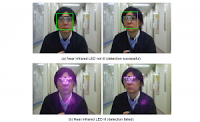 |
| screen shot from NII press release |
Madison Ruppert, Contributor
Activist Post
An associate professor at Japan’s National Institute of Informatics (NII) has developed new technology capable of thwarting the increasingly ubiquitous facial recognition systems and photo-tagging on social networking websites.
Given the rapidly increasing speed of facial recognition systems, the use of facial recognition technology in applications as disparate as mannequins in retail stores and border crossings around the world and drones and even televisions, this anti-facial recognition technology could be more needed now than ever.
Isao Echizen of NII along with Professor Seiichi Gohshi of Kogakuin University developed the technology – somewhat along the lines of the “drone-proof” clothing line – to protect individuals from having their privacy invaded by photographs taken by secret cameras or photographs taken unintentionally.
“Due of the popularization of portable terminals with built-in cameras and developments in SNS [Social Networking Services] and image search technologies, information such as when and where photographed subjects were is easily disclosed via photos taken and disclosed without their permission, which has resulted in a greater need to protect the privacy of these subjects,” states a press release from NII.
The technology developed by Echizen and Gohshi uses a near-infrared light source to disrupt the camera – and thus the photograph and facial recognition technology – without affecting the vision of the individual wearing the privacy visor.
An interesting application of this technology, which will likely become more important in the near future, is the ability to thwart augmented reality applications.
Augmented reality technology coupled with facial recognition is on the rise with companies like Viewdle, (recently acquired by Google according to WebProNews) funded by Blackberry, Qualcomm, Anthem Venture Partners, Western Technology Investment and Best Buy.
Viewdle enables people to “see the world through computer vision with face, object, and gesture recognition technology products that realize the full potential of the many advanced consumer devices that are now on the market—smartphones, tablets, and other camera-enabled devices.”
This type of technology is being deployed on a variety of platforms and thus this anti-facial recognition technology will only become more important as time goes on.
While previous proposals for protecting privacy include “physically shielding their faces or techniques for causing detection of people’s faces to fail by coloring their face or altering their hairstyle,” all of these require quite obvious alterations and in some cases can draw a great deal of attention.
Other methods of shielding one’s face, such as wearing masks, can even be prohibited in some places.
 However this new system, which at this point is little more than clear safety goggles with LEDs attached which emit light visible only to cameras, would not be as easily outlawed.
However this new system, which at this point is little more than clear safety goggles with LEDs attached which emit light visible only to cameras, would not be as easily outlawed.
The technology, though still in its infancy, is gaining a lot of attention in Japan, where it has already been featured on television.
According to Ryan Gallagher of Slate, Echizen said he has already received offers from companies seeking to work toward commercialized privacy visors in the future.
“We are developing an improved version of the privacy visor without power supply consisting of transparent materials that reflect or absorb specific wavelength,” Echizen said.
Most amazing of all is that Echizen predicts the final product will be incredibly cheap, costing “around $1 per unit.”
The goggles can essentially make the user invisible to facial recognition technologies and while they don’t quite look fashionable at this point, there is nothing stopping them from becoming increasingly sleek and less obvious.
Currently the required power supply is somewhat large so that would be another obstacle to be tackled in the near future.
Given the increasing concern with facial recognition technologies, I would be quite surprised if this type of technology and other anti-facial recognition systems did not catch on as facial recognition is deployed in even more everyday applications.
UPDATE: When considering how effective this would be at maintaining complete anonymity, one must remember that there are other methods including soft biometrics, pedobiometrics, voice recognition, and potentially in the future a kind of pharmaco-biological identification based on a previously established profile.
Therefore, one must be realistic about the potential to remain anonymous or to maintain complete privacy in the modern world. In my estimation, it is nearly impossible to be completely anonymous, at least in the United States, England, etc.
With this type of technology making leaps and bounds at nearly unbelievable speed, it’s hard to imagine it getting any easier. That being said, with advances in technologies designed to counter facial recognition and other identification and tracking systems, it could very well be possible.
Did I forget anything or miss any errors? Would you like to make me aware of a story or subject to cover? Or perhaps you want to bring your writing to a wider audience? Feel free to contact me at admin@EndtheLie.com with your concerns, tips, questions, original writings, insults or just about anything that may strike your fancy.
Please support our work and help us start to pay contributors by doing your shopping through our Amazon link or check out some must-have products at our store.
This article first appeared at End the Lie.
Madison Ruppert is the Editor and Owner-Operator of the alternative news and analysis database End The Lie and has no affiliation with any NGO, political party, economic school, or other organization/cause. He is available for podcast and radio interviews. Madison also now has his own radio show on UCYTV Monday nights 7 PM – 9 PM PT/10 PM – 12 AM ET. Show page link here: http://UCY.TV/EndtheLie. If you have questions, comments, or corrections feel free to contact him at admin@EndtheLie.com
linkwithin_text=’Related Articles:’


Be the first to comment on "Japanese researchers develop goggles to thwart facial recognition technology"